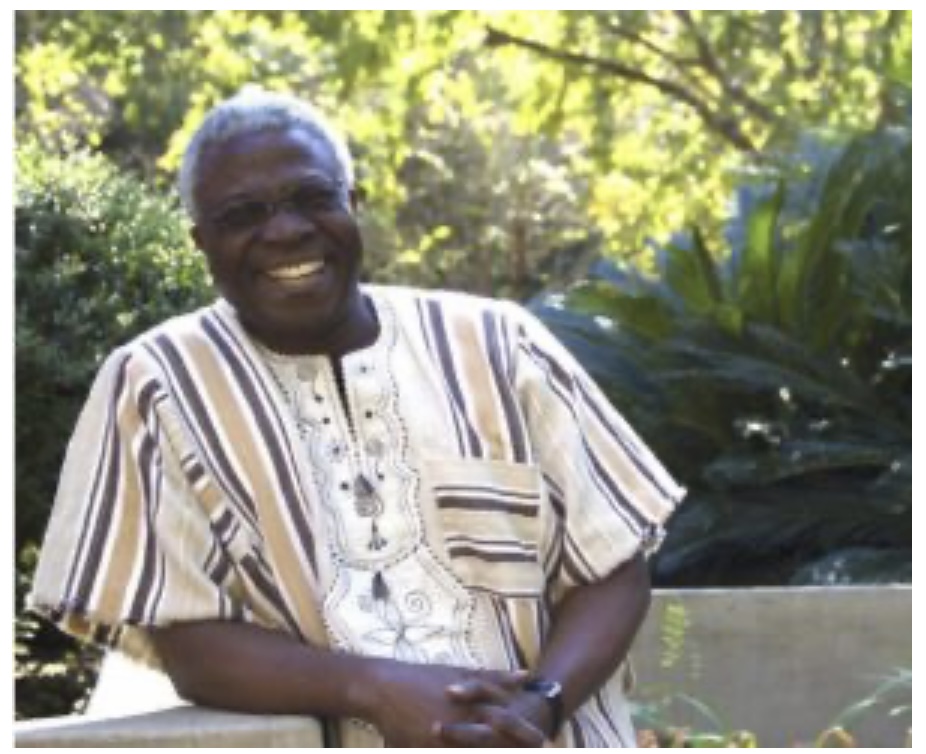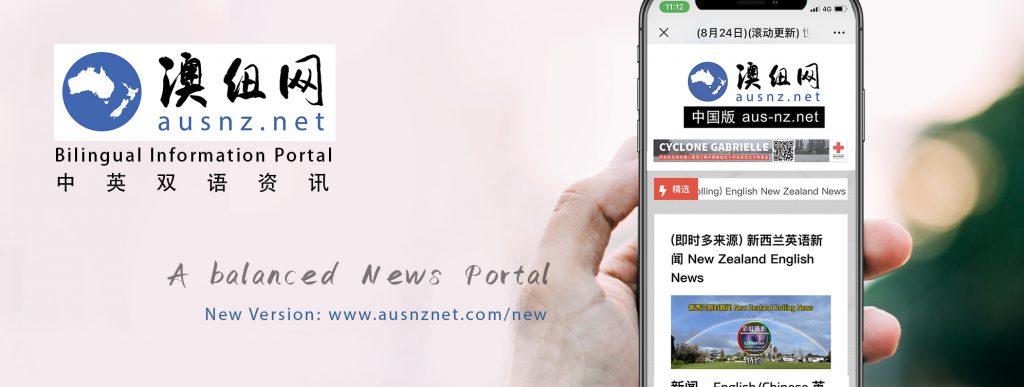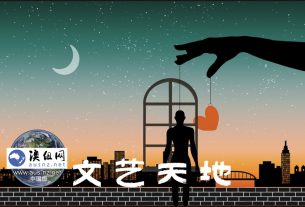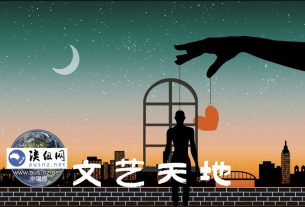(双语)尼日利亚著名诗人尼伊·奥桑戴尔谈中国诗歌
(原标题:奥桑戴尔获得中国博鳌国际诗歌奖,他感叹尼日利亚政府的领导力缺失)
曹谁译
受访人:尼伊·奥桑戴尔(Niyi Osundare)
采访者:因卡·法伯瓦尔(Yinka Fabowale)
发布:阿约林德·奥罗昆(Ayorinde Oluokun)
网站:尼日利亚PM News
时间:2023年2月13日
凭借个人声誉和成就,尼日利亚人继续为这个国家带来声誉和荣耀,与此同时,其全球形象和影响力却似乎无可挽回地在下降,主要原因是领导力的缺乏。泰米拉德·奥彭尼伊(Temilade Openiyi)最近获得了著名的美国格莱美奖。在刚刚结束的埃及开罗欧亚文学节上,作家瓦利·奥凯迪兰(Wale Okediran)获得了文学生产力金奖。这是尼日利亚在国际社会中地位下降的最新荣誉。
就在这两人之前,也就是去年12月16日,杰出荣誉教授、语言学家、多次获奖的诗人尼伊·奥桑代尔(Niyi Osundare)被授予中国博鳌国际诗歌奖,以表彰其在诗歌方面的杰出成就。这顶桂冠是博鳌国际诗歌荣誉榜上排名最高的两个桂冠之一,通常授予来自世界任何地方的著名诗人,而另一个则留给在中国有名望的另一位诗人。奥桑戴尔与徐敬亚(Xu Jingya)共同获得了梦寐以求的中国文学奖,尼伊·奥桑戴尔是非洲大陆第一位获得如此殊荣的诗人!
然而,这位桂冠诗人未能出席2022年中国上海博鳌国际诗歌节的颁奖典礼,他对获奖感慨万千。一方面,他认为尼日利亚艺术家在全球舞台上的成就证明了该国拥有丰富但未被赏识的人才,另一方面,如果该国在促进文化和艺术发展和推广的国际合作努力中不完全缺失的话,他更为痛心的是,该国本身落后了。他在对因卡·法伯瓦尔(Yinka Fabowale)的采访中谈到了这一点,并在采访中重点谈到中国文学。现在摘录访谈内容。
问:祝贺你获得新的奖项,奥桑戴尔教授,你是怎么知道这个消息的?
答:我的作品在中国被阅读,我感到惊讶和高兴,其中一部作品获得了某种程度的认可。获奖的消息是通过中国诗人曹谁传来的,曹谁是一位非常有活力和创新精神的诗人,大概在两年前我第一次读到他的作品。我真的被这位相对年轻的作家的全球影响力和普世精神所感动,他以非凡的智慧、成熟和自信直面世界。我对他打破隔阂、跨越边界、反思巴别塔及其各种隐喻的玄学的能力感到着迷,这是一次真正的尝试,让人类跨越大洲发表演讲。顺便说一句,《巴别塔的隐喻》是我2005年在斯洛文尼亚优美的布莱德城(Bled)笔会上发表的一次演讲的主题,这就是我们对话的开始。
正是曹谁告诉我上海的博鳌国际诗歌节,并说如果我有时间,来参加这个诗歌节会很好。后来,通过他我得到消息,我被选为2022年第五届博鳌国际诗歌奖杰出成就奖的共同获奖者。该奖项通常由两位著名诗人共同获得:一位来自中国,另一位来自世界其他地区。2022年的另一位获奖者是徐敬亚,他被认为是中国影响力巨大的诗人,来自尼日利亚的我是第一位获得这一奖项的非洲诗人。去年12月16日,我们两人在上海获颁奖项,那是在诗歌节盛大的开幕上。由于新冠肺炎的情况,我无法在诗歌节上实际出席,但我的获奖演讲《为什么诗歌重要》在诗歌节播放,由曹谁翻译,并由他代表我宣读。
问:这显然意味着你的诗在中国被广泛阅读?
答:我认为我的作品在中国还没有达到流行的程度,但现在通过曹谁的翻译努力,曹谁正在向中国读者介绍我的诗歌和其他作品。但我是中国诗歌和中国文学的忠实读者,也是中国绘画的崇拜者。我也在我的创意写作工作坊的“理论和概念”部分重点介绍中国诗学。中国诗歌史上最有趣的事情之一是它与中国王朝运动和更迭之间的紧密联系。不同的朝代似乎对诗歌的形式和技巧有着自己的影响,诗歌和诗人受到了应有的尊重,并提供了物质和生存的手段。诗歌是中国文化的核心,它也对政治产生了积极的影响。因此,君主政治和诗歌制度有着有趣的共存关系。
问:因此人们会预计,取代中国古代政治体制的现代政治改革,正如我们过去所知道的那样,肯定也影响了诗歌的性质和形式。就主题参与和风格而言,现在中国诗歌是什么形态?
答:是的,随着现代性的到来,中国文学已经发生了变化,当代诗歌从大约20世纪70年代开始出现。一些年轻的中国诗人对旧的范式进行了质疑,并正在进行全新的创作。顺便一提,曹谁正处在这种质疑传统的中心(曹伊之争)。我认为这些当代诗人真正向世界其他国家展示了中国文化。我们谈论文化时不能不把诗歌作为一个主要话题。你知道,诗歌从世界的一个地方传播到另一个地方。所以我现在读的诗歌并不像中国古代诗歌那样严格规范。但请注意,我不是中国诗歌的权威,我也有语言障碍;我不能用中文阅读;所以我只能阅读英文翻译。但作为一名语言学家,我知道当你把一首诗翻译成另一种语言时,你留下的就是诗歌本身。我在当代中国诗歌中看到的是某种自由,形式自由和审美自由。就题材而言,当代问题在中国诗歌中受到普遍关注。在古代中国,诗歌以自然和自然意象为主,如月亮、季节变化、动物和植物、河流和湖泊等,以其令人愉悦的多样性描绘。事实上,这是我发现中国绘画和中国诗歌之间的对话真正具有启发性的一个领域:色彩的使用和色彩反映季节变化的方式,人与自然的情绪变化的对应关系,一天中不同时期变化的显著动态和可预测性,丘陵、山脉、河流所代表的自然地形以及道路。人类也是一个最重要的主题,尤其是乡村、农民和手艺人。还要记住,在过去的一个世纪里,中国经历了不同的文化变化(有些人会说是革命)。相比过去的审美,每一次变化都影响了中国的艺术和文化。
问:我相信尼日利亚有这么多像沃莱·索因卡(Wole Soyinka,1986年获得诺贝尔文学奖)这样具有国际地位的诗人,你的好朋友,已故的奥基博(Okigbo),应该能够主办这样一场重大的全球文学活动。那么,究竟是谁能够举办这样的文学赛事,或许需要什么地方来资助呢?
答:杰出的加纳政治家和泛非主义者恩克鲁玛(Nkrumah)说:“寻求政治王国,所有其他的东西都将添加到你身上。”首先,政治环境必须友好。就在这次采访的地方,在过去的24小时里,我们都在停电!在许多其他地方,他们已经好几个星期没有吃的了!这是一个国家,尽管我们没有战争,也没有重大灾难,但国家电网可以随心所欲地频繁崩溃。由于燃料短缺,万能的救世主“发电机”的使用变得不可靠。你愿意把世界诗人带到这里,在黑暗中跌跌撞撞,在炎热中让人吐槽吗?安全性呢?今天,谁能以举办国际节日的名义将这些诗人中的任何一位带到尼日利亚来,他们极有可能被强盗和绑匪拦路绑架,以换取严重的赎金,而这些人现在已经成为尼日利亚的另一个政府?我们各地的快速通货膨胀和人民的痛苦又如何呢?我们路上遇到死亡怎么办?我们那令人窒息、垃圾堵塞的道路和街道怎么办?正如我多次说过的,在尼日利亚,政府在人民生活中最重要的领域缺席。你知道,无论你走到哪里,我们的政府总是让我们失望……这是1989年泛非作家协会(PAWA)在阿克拉(加纳首都)成立时我们遇到的问题。你会想到,鉴于尼日利亚作家在非洲大陆占据主导地位,这样一个重要组织的总部应该“自然而然”设立在尼日利亚,但这从未发生过。加纳政府已经在阿克拉的一个设施完善的地区建立了一组美丽的功能性建筑,有效地符合泛非洲作家协会的目标。在尼日利亚历史的那段时期,我们被军事独裁者统治,他们将作家关押起来,他们的成员后来将尼日利亚作家协会前主席肯·萨罗·维瓦(Ken Saro Wiwa)绞死。是的,尼日利亚之笔和尼日利亚之剑的关系是那么亲切!当你真正审视这件事时,你会发现,尼日利亚的作家、艺术家和其他有创造力的人的荣耀是在尼日利亚政府的慷慨帮助下实现的吗?绝对不是。
事实上,这是一个不幸的状况,因为文学节能够通过自己的方式来提高主办国的声望和认可度,当地作家还可以与世界其他地方的作家交流,与他们交流创意和技巧,建立友谊和联系,这些友谊和联系往往会持续一生。这正是麦德林国际诗歌节多年来所能带来的好处,它促进了世界上一些最伟大的诗人的聚会,并用来自世界各地的多种语言的诗歌丰富了哥伦比亚的氛围。2010年,当我来到麦德林,被街上的普通人称为“诗人”时,我怀着悦耳的喜悦接受了我的新头衔。一天后,我成为了露天剧场的国际主角之一,数百名友好、欣赏的观众包围着你。此后,我们在市场、植物园和大学教室里朗诵诗歌。这一切背后的动人力量和精神是一位名叫费尔南多·伦德(Fernando Rendon)的人,他是著名诗人和文学家,也是世界诗歌运动的创始人,该组织提倡诗歌、人权和社会政治正义之间联系的必要性和必然性。我很高兴得知他也是博鳌国际诗歌奖杰出成就奖的前获奖者之一。在鹿特丹、柏林、伦敦、美国、古巴、塞尔维亚、南非和世界上许多其他地方都有类似的诗歌节,诗歌被视为文化和外交事务的重要平台。
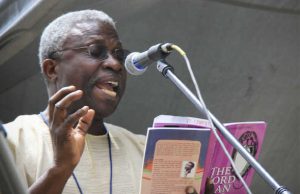
问:很遗憾,你提到的问题会使这个国家失去举办世界艺术节的机会。尽管我们在文化上,有很多值得展示的东西。
答:你说的很对,尼日利亚有很多值得展示的地方。我国是一个资源丰富的国家,其领导人不知道如何利用这些资源。没有一个真正的公民能够为今天的国家感到骄傲。失败太多。错过的机会太多了,这不是我们梦想中的尼日利亚。这个国家的一切都在下降,下降,下降!!!没有电力,没有食物,没有人身安全。如果你头疼,而且你是一个需要治疗的政治家,那么你可以坐飞机去伦敦、巴黎或纽约,或者最近去印度。如果你今天有什么想对我们尼日利亚人说的话,你就去伦敦查塔姆宫,作为帝国新生的听话仆人。目前,我们不想邀请任何人来这个国家参加诗歌节。但我希望这个国家能够克服目前的问题,如果我们诚实、勤奋地为所需的变革而努力,我们将能够在未来迎接世界。当那些管理我们国家的人是领导人而不是统治者的时候。
问:让我们回到中国的主题,奥桑戴尔教授。就在我们开始讨论国际诗歌运动之前,我有这样一个印象,我可能不是在奥卢森塔(Olosunta)的首席牧师面前,而是和一位中国牧师坐在一座宝塔里,现在把你描述为“中国人”可以吗?
答:哈哈!现在,你已经变得无可救药地富有诗意了。好吧,叫我中国人,叫我法国人,叫我犹太人,叫我阿拉伯人,叫我乌尔霍博人,叫我豪萨富拉尼人,叫我伊博人,叫我约鲁巴人(后四者为尼日利亚主要民族)。只要知道人性是共同的一个,我用大写字母“H”拼写我自己的人性。这是非常重要的。我读过中国诗歌,这对我来说很有意义。事实上,在我的获奖感言中,我不得不提到一些我读过并欣赏过的中国老诗人(郭沫若和艾青)。年龄越大越好——如果它过去是而且依然是很好的话。我想曹谁在回信中略带讽刺地说,我提到的那些是老诗人,我引用的一首诗有100年的历史了,不能代表当代中国诗人。年龄越大越好——如果它过去是而且仍然是很好的话。好的诗歌就像葡萄酒:随着年龄的增长而成熟。永远改变中国的风景和思想风貌的人——毛主席,也是一位诗人。他不仅在指导人民,还向他们展示如何耕田,如何反抗压迫者;他有时会用诗歌,好的诗歌来推进自己的思想。我读过很多他与中国著名诗人交往的例子,与他们交流诗歌和思想。你能想象今天尼日利亚国家元首与沃莱·索因卡(Wole Soyinka)或其他人交流诗歌吗?
问:在我们的统治阶级中,你仍然有一些知识分子和文学头脑的政治家,比如已故的马曼·瓦察(Mamman Vatsa)。
答:是的,可怜的马曼·瓦察,但他从来都不是国家元首……我永远不会忘记那个人为文学/艺术界所做的一切。他是我们1985年12月在阿布贾举行的ANA(尼日利亚作家协会)年度大会的东道主。那是他带领我们(尼日利亚作家协会的代表团)登上首都的山,并说这片土地是你们的。当我们行进时,他和奇努阿·阿切比(Chinua Achebe)就在前面,我们其他年轻的作家都是热情的文学士兵,满怀梦想和勇气。难忘的时刻!我永远不会忘记,当时ANA是理想主义的。多么团结。这是一次我们深爱的ANA在同一个屋檐下保持理智和安全的时刻,我们在会后发表的公报处理了迫在眉睫的国家问题,没有推诿现实的状况,也没有虚伪的恐惧。我多么希望人们不需要用怀旧的词来谈论那些美好的过去!
问:你的获奖感言题目为《诗歌为什么重要》。你能帮我们介绍这篇演讲吗?
答:这是一个为六分钟演讲而设计的简短演讲。我所说的基本上是,诗歌之所以重要,是因为它是我们存在的音乐、灵魂的音乐、心灵的音乐、思想的音乐、未来的音乐。诗歌之所以重要是因为它看到了团结,而其他人却看到了分裂。诗之所以重要,因为它为我们对抗不公正提供了武器。它教会了我们最好的接触方式——与那些快乐的人一起快乐;尽管我们的歌声为我们带来希望的快乐铺平了道路,但我们仍怀着感伤而悲伤;在拓展视野的同时加深我们的洞察力;约束我们的冲动,同时鼓励我们抵制邪恶;每一分钟都握着我们的手,带领我们走向真理之家,美学之家,灵魂伴侣。诗歌之所以重要,是因为它在我们身上恢复并维系着所有人性。“敢于与众不同,积极与众不同!”这是真正的诗歌命令。认真思考,深入思考。把勇气当作盾牌……让我借用这个“著名”的获奖感言的最后一段来结束这次采访:
诗歌之所以重要,是因为它总是提醒我们血液中的共同颜色、饥饿的暴力、邪恶的丑陋、森林的衰退、河流的脆弱以及地球的叹息。诗歌永远不会忘记,也永远不会停止提醒未来,它对过去的亏欠。无论正义隐藏在哪里,你都可以相信诗歌去寻找和发现它。因为在它抒情的居所里,生活着我们的生命之灯。
(https://thenewsnigeria.com.ng/2023/02/15/osundare-wins-boao-int-poetry-prize-in-china-laments-everywhere-you-go-our-government-keeps-disappointing-us/)
(完)
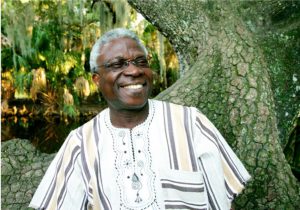
尼伊·奥桑戴尔(Niyi Osundare),尼日利亚诗人、剧作家、散文家、学者;著有18部诗集、2部诗选集、4部戏剧、2部散文集,以及许多学术文章和评论。他的众多奖项包括尼日利亚作家协会(ANA)诗歌奖、吉百利诗歌奖、英联邦诗歌奖、诺玛奖(非洲最负盛名的图书奖)、Tchicaya U Tam’si非洲诗歌奖(“非洲最高诗歌奖”),以及丰隆/尼科尔斯奖,以表彰“杰出的文学创作以及对非洲人权的重大贡献”。2014年,他获得尼日利亚国家功绩勋章,尼日利亚杰出创意和智力成就最高奖。曾任伊巴丹大学英语系教授和主席,现任美国新奥尔良大学名誉杰出英语教授,尼日利亚伊巴丹学院客座教授。
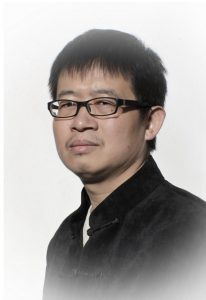
曹谁简介:
曹谁,诗人、小说家、剧作家、翻译家,北京师范大学文学硕士,中国民主同盟盟员。原名曹宏波,字亚欧,号通天塔主。曾参加鲁迅文学院第14届作家高研班、中国文联第9届编剧高研班、中国作协第10次作代会、第8次青创会。1983年生于山西榆社,2008年去职远游,在西藏、新疆周游数月而返青海,开始职业写作生涯,现居北京。2007年发起大诗主义运动,2017年倡导剧小说运动,2017年加入世界诗歌运动,2018年发起曹伊之争,创建诗战十八军,2023年倡导诗电影运动。著有诗集《亚欧大陆地史诗》《通天塔之歌》《帝国之花》等10部,长篇小说《巴别塔尖》《昆仑秘史》(三部曲)《雪豹王子》等10部,文集《大诗学》《可可西里动物王国》《西藏新疆游历记》等4部,童话《雪豹王子》《可可西里动物王国》《三江源国家公园》等18部,译著《理想国的歌声》《太阳中的黄金鸟》《伊斯坦布尔的脚步》等3部,主编《汉诗三百首》《诗战十八军诗选》《大诗选》等5部,电影剧本《昆仑决》《子弹上膛》《一个王朝的背影》、电视剧本《孔雀王》和舞台剧本《雪豹王子》等百余部集。作品发表于《人民文学》《诗刊》《作家》等文学杂志,入选上百部权威选本。有多部长篇小说改编为影视剧、广播剧、舞台剧等。有作品翻译为英、法、德、俄、日、韩、瑞典、希腊、印地、意大利、西班牙、土耳其、阿拉伯等20余种文字,在国际诗坛有三十多位著名诗人写作评论,被中国诗坛称为“国际曹”,被印度杰出诗人拉蒂·萨克塞纳称为是“领导新世界的年轻一代”的代表诗人。曾获首届中国青年诗人奖、第7届中国长诗奖、第5届青海青年文学奖之“文学之星”、第4届曹禺杯剧本奖、第8届意大利罗马当代国际诗歌艺术学院奖之阿波罗·狄奥尼索斯诗歌奖诗歌奖、第12届俄罗斯金骑士奖、第5届华语诗歌春晚2019年度十佳诗人等50多项省级以上文艺奖。曾参加第30届麦德林国际诗歌节、第26届哈瓦那国际诗歌节、第14届印度Kritya国际诗歌节、第4届青海湖国际诗歌节等多个国际诗歌节。系中国作家协会会员,中国电影文学学会会员,世界诗歌运动协调员,《大诗刊》主编,《世界诗歌》副主编,《世界诗坛》副主编,《世界诗人》英文主编,《国际诗人》副主编,《国际诗歌》英文主编,丝绸之路国际诗歌节常务副主席,丝绸之路国际诗歌春晚总策划,华语诗歌春晚副总导演,博鳌国际诗歌节常务副秘书长。
广告 | Advertisement
在澳纽网做广告 | Advertise with us
Osundare wins Boao Int Poetry Prize in China, laments, “Everywhere you go, our government keeps disappointing us”
Professor Niyi Osundare
Published By Ayorinde Oluokun
13th February, 2023

With their personal reputation and accomplishments, Nigerians have continued to bring the country fame and glory at a time its global image and relevance appear to have irredeemably dipped, due principally to poor leadership. Temilade Openiyi’s recent win of the prestigious Grammy award and renowned physician-writer, Dr. Wale Okediran’s decoration with the Gold Medal for Productivity in Literature at the just- concluded Eurasian Literary Festival of Festivals in Cairo, Egypt are the latest instances of such distinguished honours that have rubbed off on Nigeria’s sagging status among the comity of nations.
Just before these two, precisely on December 16, last year, Niyi Osundare, Distinguished Emeritus Professor, linguist and multiple award-winning poet, was awarded the Boao International Poetry Prize for Outstanding Achievement in Poetry in China.
The diadem, one of the two which rank the highest in the hierarchy of the Boao International Poetry honour list, is normally awarded to a prominent poet from any part of the world, while the other is reserved for another poet found to have distinguished himself within China. Osundare co-won the coveted Chinese literary prize with Xu Jingya, the first poet from the African continent to be so honoured!
The poet laureate, who, however, could not attend the award ceremony, at the 2022 Boao International Poetry Festival in Shanghai, greets the recognition with mixed feelings. On one hand, he sees Nigerian artistes’ feats on the global stage as a testament to the abundant but unappreciated talents in the country, on the other, he is even more saddened that the country itself lags behind, if it is not entirely missing in the international collaborative efforts at fostering cultural and artistic development and promotion.
He speaks on this and more in this interview with YINKA FABOWALE.
Excerpts:
Q: Congratulations on your new award, Prof. How did you get to know about it?
A: Well, surprised and delighted that my work is being read in China and one is getting some kind of recognition from there. The news of the award came to me through Cao Shui, a tremendously energetic and innovative poet whose work I read for the first time almost two years ago. I was really moved by the global reach and ecumenical spirit of this relatively young writer who approached the world with remarkable wisdom, maturity, and self-assuredness. I am fascinated by his ability to break down walls, cross boundaries, interrogate the metaphysics of the Tower of Babel and its various figurations, in a genuine attempt at getting Humanity to speak across the continents. Incidentally, the Babel trope was the prop of a lecture I delivered at the PEN conference in 2005 at a town called Bled, a spectacular place in Slovenia. I sent him a few words from my own essay too; and that was where our dialogue began.
It was he who told me of the Boao International Poetry Festival in Shanghai, and said that if I had the time, it would be good for me to come to attend the festival. Then later, it was through him, I got the news that I had been selected as co-winner of the 2022 International Poetry Outstanding Achievement Award. This award usually goes jointly to two prominent poets: one from China, and the other from the other parts of the world. The two winners in 2022 are Xu Jingya, described as a famous Chinese poet and yours sincerely from Nigeria. I learnt that I was the first African poet to receive this award. The two of us were recognized in Shanghai on the 16th of December last year, on the first night of the festival and its grand opening. Because of the Covid situation, I couldn’t register my physical presence at the festival, but my acceptance speech, entitled “Why Poetry Matters”, was translated by Cao Shui and presented on my behalf by him.
That apparently implies that you are read in China?
Well, I would not consider my writing as popular in China yet, but now, through his translation effort, Cao Shui is introducing my poetry and other works to Chinese readers. But I am an ardent reader of Chinese poetry and Chinese literature generally and an admirer of Chinese painting. I also teach Chinese poetics in the theoretical/conceptual part of my creative writing workshops. One of the most interesting things about the history of Chinese poetry is the close link between it and Chinese dynastic movements and transitions. Different dynasties seemed to have their own impact on poetic forms and techniques, and poetry and the poet were accorded due respect and provided the means of sustenance and survival. Poetry was so central to Chinese culture that it also affected politics positively. So, monarchical politics and the institution of poetry had an interesting coexistence.
Q:So, one expects that the modern political reforms that replaced the Chinese political system, as we used to know it, must also have affected the character and form of the poetry. What is it like now in terms of thematic engagement and style?
A:Oh yes, things have changed, as modernity has taken its toll, with the coming of contemporary poetry starting from about the 1970s or so. There are young Chinese poets who have interrogated the old paradigms and are breaking out on their own. Incidentally, Cao Shui is right in the centre of that kind of tradition. Still profoundly Chinese but also global at the same time, I think these are the people who have really opened up Chinese culture to the rest of the world… We cannot talk about culture without making poetry a major topic. You know, poetry travels from one part of the world to another. So, the poetry I am reading now is not as regimented and rule-governed as ancient Chinese poetry. But please note: I am not an authority in Chinese poetry, and I also have a language disability there; I cannot read in Chinese; so I can only read it in English translation. But as a linguist myself I know that when you translate a poem into another language what you leave behind is the poetry. What I see in contemporary Chinese poetry is a certain kind of freedom, formal freedom, and aesthetic freedom. In terms of subject matter, contemporary issues have come to receive attention in Chinese poetry. In the past, that poetry was dominated by Nature and natural images such as the moon, change of seasons, flora and fauna, rivers and lakes, etc, depicted in their delightful variety. In fact, this is one area where I find the dialogue between Chinese painting and Chinese poetry really edifying: the use of colour and the way colour reflects the change of seasons, change in the mood of man and nature, the remarkable dynamism and predictability of the changes that account for different periods of the day, the physical topography as represented by the hills, mountains, rivers, and the road. The Human Being was also a predominant subject, especially rural farmers, peasants, and artisans. Also remember that China has gone through different cultural changes (some would say revolutions) in the past century. Each instance of change has impacted Chinese art and culture.
Q:I believe Nigeria, having so many poets of international status like Wole Soyinka, your good self, the late Okigbo, should be in a position to host such a major global literary event. So, who sets the ball rolling and what would it require to fund it, perhaps?
A:Seek ye the political kingdom, said Nkrumah, that remarkable Ghanaian statesman and Pan-Africanist, and all other things shall be added unto thee. First, the political space will have to be friendly. Right here where this interview is taking place, for the past 24 hours we have not had electricity! In many, many other places, they haven’t had it for weeks! This is one country where the national power grid can break down as frequently as it pleases, even though we are in no war situation, and we have no major disaster. With the scarcity of fuel, the use of the almighty savior, the power generator, has become unreliable. Will you want to bring world poets here to stumble in our darkness and roast in the heat? What about security? Who can bring any of those poets to Nigeria today in the name of holding an international festival, with the dreadful possibility of their being waylaid and abducted for crippling ransoms, by bandits and kidnappers who now constitute an alternative government in Nigeria? What about the galloping inflation we have all over the place and the suffering of our people? What about the deaths on our roads? Our stifling, garbage-choked roads and streets? As I have said many times, in Nigeria, government is absent in the most important areas of the people’s lives. You know, everywhere you go, our government keeps disappointing us… This was the same problem we had when the Pan-African Writers Association (PAWA) was inaugurated in Accra in 1989. You would have thought that the headquarters of such an important organization should ‘naturally’ come to Nigeria, given the predominance of Nigerian writers on the continental level. But it never happened. The Ghanaian government had already laid out a beautiful, functional structure in a well-appointed part of Accra, that suited PAWA’s purpose efficiently. In that period of Nigeria’s history, we were ruled by military dictators who put writers in detention, and whose members would later hang Ken Saro Wiwa, a former President of the Association of Nigerian Authors. Yes, the relationship between the Nigerian Pen and the Nigerian Sword was that cordial! When you really look at the matter, you discover that the glories of writers, artists, and other creative people in Nigeria have been achieved in spite of beneficence from the Nigerian government, not because of it.
This is an unfortunate situation, really, because literary festivals have their own way of boosting the prestige and recognition of their host countries, in addition to making it possible for local writers to mix with writers from other parts of the world, trade creative ideas and techniques with them, and establish friendships and associations that often last a lifetime. This is the kind of benefits the Medellin International Festival has been able to foster in the so many years it has facilitated the gathering of some of the world’s greatest poets and enriching the Colombian atmosphere with songs in numerous languages from many parts of the globe. When I arrived in Medellin in 2010 and was hailed “Poeta” by common people in the streets, I embraced my new title with melodious delight. A day later, I was one of the international performers in an amphitheater, with hundreds of friendly, appreciative people as audience. Thereafter, we performed poetry in the marketplace, botanical garden, and college classrooms. The moving force and spirit behind all this is a man called Fernando Rendon, renowned poet and man of letters in his own right, and founder of the World Poetry Movement, an organization which promotes the necessity – and inevitability – of the connection between poetry, Human Rights, and socio-political justice. I was delighted to learn that he is one of the former winners of the International Poetry Outstanding Achievement Award which has just come my way. There are similar festivals in Rotterdam, Berlin, London, United States, Cuba, Serbia, South Africa and many other parts of the world where poetry is valued as a major platform in cultural and diplomatic matters.
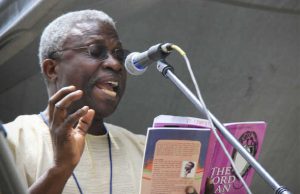
Q:It’s such pity the problems you have cited would deny the country the opportunity of hosting the world festival. It has so much to showcase, culturally.
A:You are right: there is a lot to showcase about Nigeria. Ours is an abundantly endowed country whose leaders do not know what to do with the endowments. No genuine citizen can be proud of the state of the country today. Too many failures. Too many missed opportunities. This is not the Nigeria of our dream. Everything about this country has gone down, down, down!!! No electricity, no food, no personal safety. If you have a headache and you are a politician in need of treatment, off you jet to London or Paris or New York, or, these days, to India. If you have anything to say to us Nigerians today, you go to Chatham House in London as the newborn obedient servant of the Empire that you are. I never knew Nigeria would sink this low. At the moment, this is not the country one would want to invite anyone to for a festival. But I hope that that country will overcome the present problems and we will be able to welcome the world in the future – if we work honestly and assiduously for the required change. That will be when those who administer our country are leaders, NOT rulers.
Q:Let’s return to China, Prof. Just before we veered into discussing the International Poetry Movement, I got this impression that I was probably not before the Chief Priest of Olosunta, but sitting right in a pagoda with a Chinese priest, will it be right to describe you as a ‘Chinese’ now?
A:Ha, ha! Now, you have gone irredeemably poetic. Well, call me Chinese, call me French, call me Jew, call me Arab, call me Urhobo, call me Hausa/Fulani, call me Igbo, and call me Yoruba. Just know that Humanity is one, I spell my own humanity with an uppercase ‘H’. It is very important. I read Chinese poetry and it speaks to me. In fact, in my acceptance speech, I had to mention some of the old Chinese poets whose works I have read and enjoyed. I think Cao Shui said sarcastically that those were old poets, and that one of the poems I cited was up to 100 years old. Well, the older the better – if it was and is still good. Good poetry is like wine: it mellows and matures with age. The man who transformed the landscape and mindscape that changed China forever, Chairman Mao, was also a poet. He was not only guiding the people, he was showing them how to hold the plough and how to react against their oppressors; he sometimes used poetry, good poetry, in advancing his ideas. I read of a number of instances in which he engaged with leading poets in China … trading poems and ideas with them. Can you imagine the Head of State of Nigeria today exchanging poetry with Wole Soyinka or whoever?
Q:Well, you still have some intellectual and literary-minded statesmen among our ruling class too, the late Mamman Vatsa, for instance…
A: Yes, poor Mamman Vatsa, but he was never Head of State… I will never forget what that man did for the literary/arts community. He was our host for the annual ANA convention in Abuja in December, 1985. That was when he led us (a delegation of Association of Nigerian Authors) up the hill in the Capital City and said this piece of land is yours. He and Chinua Achebe were right in front as we marched along, the rest of us, younger writers, were the enthusiastic foot soldiers fervent with dreams and daring. Memorable moment. I will never forget how determined, focused, and idealistic ANA was at that time. And how united. This was a time our beloved ANA stayed sane and secure under ONE and the SAME roof, and our after-convention communiques addressed burning national issues without prevarication or fear of hypocrisy. How I wish one didn’t need to talk about those good old days in nostalgic terms!
Q:“Why Poetry Matters,” you entitled your acceptance speech. Could you unpack this thesis for us, please?
A: Yes, it is a short speech designed for a six – minute delivery. What I am saying there is basically that poetry matters because it is the music of our being, the music of our soul, the music of our mind, the music of our ideas, the music of our future. Poetry matters because it sees unity where others see severance. Poetry matters because it provides us a weapon for our fight against injustice. It teaches us the best ways of reaching out – rejoicing with those who rejoice; sorrowing with the sorrowful even as our songs pave the way to the possibility of hopeful joy; deepening our insight while expanding our horizon; disciplining our impulse while emboldening our resistance to evil; holding our hands every minute and leading us to the House of Truth, and Beauty, its soulmate. Poetry matters because it restores and sustains in us all that is Human – and humane. “Dare to be different, positively different!”, genuine poetry commands. Think hard, think deep. Wear courage like a shield…. Let me conclude this interview by poaching the last paragraph of the ‘famous’ acceptance speech:
Poetry matters because it never fails to remind us of the common colour of the blood in our veins, the violence of hunger, the ugliness of evil, the frailty of our forests, the vulnerability of our rivers, and the sigh of our Planet. Poetry never forgets, and never ceases to remind the Future of its debt to the Past. Wherever Justice is hidden, you can trust poetry to seek and find it. For in its lyrical habitation lives our Lamp of Life.
(https://pmnewsnigeria.com/2023/02/13/nigeria-not-reckoned-with-due-to-leadership-failure-osundare/#)
(End)
新西兰 澳纽网出品
编辑:小图
974 views


